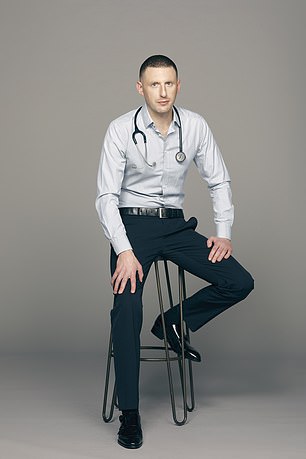
Changing people’s minds is difficult, time-consuming and tiring, says Dr Max (pictured)
Changing people’s minds is difficult, time-consuming and tiring. Many of my patients think self-harm, drugs or alcohol are the answers to their problems.
In treating depression and anxiety we have to coax them away from such negative or anxious beliefs. The gains aren’t consistent and there are plenty of setbacks, but it’s something that, as a psychiatrist, I undertake on a daily basis.
However, gently guiding a patient to change is different to attempting it with a friend.
This is precisely the problem I’ve been facing over the past few months with a friend I’ll call Darren, who has been sucked into the anti-vaxxer quagmire.
It’s difficult to ignore the issue as he posts stuff on social media and talks about it constantly when we meet up. Several people have suggested I stop speaking to him. This is what actress Jennifer Aniston has done — she’s said she has cut off anyone in her friendship circle who has refused the Covid jab.
Personally, I think this is a mistake, particularly if you really care about ensuring people get vaccinated.
I’ve been horrified to see some doctors post mocking, spiteful or sanctimonious comments about anti-vaxxers. Do they really think being unpleasant to people or laughing at them is going to change their minds? Every single piece of research into behaviour change tells us this won’t work. Quite the opposite — it causes the anti-vaxxers to become more emphatic.
Darren has some truly bonkers theories. As someone who has not only seen the devastating effects of Covid first hand but also cares passionately about evidence and science, I find his conspiracy theories and utter misunderstanding of basic science — let alone immunology and microbiology — deeply frustrating. I’d actually border on finding it insulting and offensive. But what good would cutting him out do? We should be able to tolerate different views voiced by the people in our lives. I also believe isolating these people guarantees they never change.
Our beliefs tend to be astonishingly entrenched. There’s good evolutionary reason for this — we are bombarded with information, much of which is contradictory, so if we kept changing our mind on things, life would feel chaotic and decision-making insurmountable.
So how do we bring people like Darren round? Research into how to engage anti-vaxxers suggests there will always be a hardcore group who are so resistant to change it’s simply not worth trying. Their conspiracies are often serving a deep-rooted psychological need.
I read recently about a man whose son had died in 9/11. He had become a conspiracy theorist about the attacks and it absolutely consumed his life. It became clear that this was all bound up in his grief — a way that he could understand and explain his son’s death. You have no hope of changing this man’s view unless you can understand and provide something that can replace the need it is fulfilling.
It will be the same with some anti-vaxxers. But Darren doesn’t fall into this group. I think he’s just misguided. He dropped out of school before GCSEs so has limited understanding of science. He gets his news and views from social media. He’s had run-ins with the authorities, so tends to be wary of people in charge.

But he’s horrified to see some doctors post mocking remarks about anti-vaxxers (stock photo of a person having a jab)
You can see how all this makes him susceptible to anti-vaxxer nonsense.
But the worst thing to do would be to say he is stupid or wrong.
For me to say that as a doctor would be even worse — although we’re old and close friends, I represent the medical establishment and am therefore someone not to be trusted. So, far from lecturing him, I have embarked on several long, fun dinners where I listen to him. I want to understand what he is basing his beliefs on.
He isn’t convinced by all the anti-vax arguments. I make it clear I agree when he mentions the myths he doesn’t believe. This shows him I’m listening and forges a sense that he isn’t wrong about everything. He is worried about his immune system being overwhelmed. He thinks there is mercury in the vaccines. He believes they have been rushed. On some points I correct him, but mostly I just listen.
Over a few months, I gently try to educate him about science in general, so he has the tools to challenge the anti-vaxxer ideas himself. I steer the conversation on to the immune system. He’s into fitness so I use this as an ‘in’, discussing the impact of exercise on the immune system.
After many dinners, drinks and texts, eventually, bingo! He mentions a story he has read about an anti-vaxxer dying of Covid.
This allows me to tell him about people I’ve seen who have died. He really cares about mental health, so I emphasise the impact lockdown has had on this aspect of people’s lives, and that we have to do everything we can to avoid another one. He’s patriotic, so I talk in terms of the vaccination being a duty: any side-effects are a sacrifice we should make for the greater good.
During this process he moves house and doesn’t have wifi for about six weeks: I think a break from social media helps to de-condition him. It allows my ideas to germinate in his mind.
And then, two weeks ago he mentions, in a text about something entirely different, that he has had his first jab. Now I just need to get him to have his second.
Girls outperformed boys again in this year’s GCSEs. Females in general also live longer and have lower rates of drug and alcohol addiction.
Their cancers get more funding and they are less likely to be murdered or kill themselves. It seems the odds are increasingly stacked against men, yet voicing this risks opprobrium.
My fears for Tilly on Strictly

Gordon Ramsay’s daughter Tilly (pictured together) has joined Strictly, at the age of 19
Gordon Ramsay’s daughter Tilly has joined Strictly, at the age of 19. No doubt her friends are congratulating her on landing a high-profile gig. But I worry about her.
While she has a big social media following, her major claim to fame is her father and I wonder how prepared she is for the glare of the spotlight?
The scrutiny at such a young age is merciless, particularly when you can’t carefully curate and control what people see — as she will be able to do on her social media.
Fame is intoxicating but fickle and the industry is cut-throat and merciless. It spits people out when they have served their purpose. Depending on the reflected glory of her dad makes her time in the spotlight all the more fragile.
Thomas Markle has said he will take his daughter Meghan to court in order to see his grandchildren. Quite right — grandparents deserve access to their grandchildren just as a parent does, and children should have the right to see their grandparents.
Too often in family feuds this important relationship is overlooked. Grandparents are a connection to the past. They make us feel grounded, offer reassurance and help us develop a sense of belonging.
Yet grandparents still have no rights in the UK. They can be cut out without any consideration. How is this right?
Dr Max prescribes… A fun musical

‘Last week I went to see Anything Goes (pictured) at the Barbican in London. If you can, do go’, said Dr Max
Last week I went to see Anything Goes at the Barbican in London. If you can, do go. Yes, the performers are wonderful and clearly delighted to finally be back to work after so much uncertainty.
But for me the real buzz came from the audience. The sense of pure joy from the auditorium was electrifying: I’ve never felt so much energy, bordering on hysteria.
Despite it being a comedy, the woman next to me was in floods of tears — she explained it was simply because she was sitting in the theatre and enjoying herself so much. Book your own ticket now!
Source link : https://www.dailymail.co.uk/femail/article-9895831/DR-MAX-PEMBERTON-Yes-talk-round-anti-vax-friend.html











